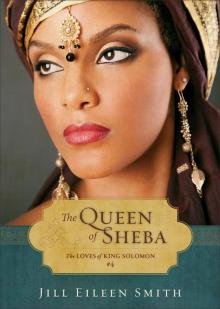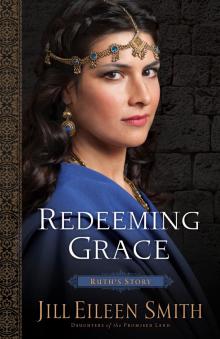- Home
- Jill Eileen Smith
Daughter of the Nile Page 2
Daughter of the Nile Read online
Page 2
“My lord,” I said, hating the formality and the familiarity. I had grown up with this boy who now thought himself a man but acted as selfish and foolish as most of the pharaoh’s nephews or sons. Spoiled boys do not make wise men.
“Siti, my sweet,” he said, taking my free hand in his.
I nodded and stepped back as quickly as I dared.
“I had hoped to meet you here.” He waved a hand over the crowd. “Though I daresay I did not expect it, considering the size of this gathering.”
I had to lean in to hear his shouted words above the sudden pounding of the drummers, who beat their instruments so loudly the sound rivaled the winds of the khamsin in springtime. Abdukar huddled closer into the crook of my arm, his small body shivering against me. “The celebration is a good rest for them from their labors,” I said, though I knew Nakhti barely heard.
He touched my shoulder and motioned for me to follow, but I shook my head. He wanted to get me away from the crowds. I would not, could not allow such a thing. I slipped my arm through Salama’s and nodded for him to move on.
His look held disappointment and perhaps a hint of anger, but I did not care. I was not bound to him yet. He could not command me. I turned and fairly pushed Salama in the opposite direction, back toward the pier where our ship awaited.
“You cannot avoid him forever, you know.” Salama stopped, forcing me to do the same. “And I don’t know where you think we are going, but I intend to enjoy this festival.” She laughed, but this time her tone carried an edge. “This is my last festival where I am free to enjoy myself, Siti. Next year I will be an ornament on Hamadi’s arm, and I will never be free to mingle this close to the people again.” She turned us around with a gentle nudge.
Music from the town carried to us. There would be jugglers and storytellers and reenactments of the rituals that went on inside the temples—some going too far to be public, but this one time of year no one seemed to care. I had seen enough last year to make me question my loyalty to Bastet, only because the sensuality of the dances made me fear they had embarrassed her. Surely behind closed doors where the priests and priestesses lived, things did not grow so wild or out of hand. Surely the unions there were like that of lovers, true and devoted. Something far different than what I knew would soon abound in the streets this night.
“Where is Mother?” I looked around but saw no sign of her.
Salama shrugged. “I am sure she has already entered the crowd and is even now watching the plays. Come.” She took my hand, leaving me no choice this time but to follow.
I glanced back toward the pier, but it would do no good to try to stay on the ship alone. My maid, who always stayed at my side, had been given freedom tonight to enjoy the festivities. Only the guards awaited our commands and surrounded us wherever we walked.
I followed my sister, drawn by the erotic nature of one of the dancers ahead of me. She twirled with such grace to a song that brought an ache to my heart.
I compare you, my love, to a mare among Pharaoh’s chariots. Your cheeks are lovely with ornaments, your neck with strings of jewels.
I had seen my father’s chariots decked out in such a sparkling fashion that people fairly worshiped them. Would to Bastet that my future husband would drape my neck with jewels so fine. Would to Bastet that my future husband—please let it not be Nakhti—would find me beautiful and exotic and enticing and all he could want in a wife. A husband who understood my heart’s longings. A man worthy of love.
3
“There is nothing to do,” I complained to Akila two weeks later. I dipped my right foot into the wading pool of my mother’s inner court, listless and bored. Abdukar slept peacefully beneath the shade of a low-hanging palm not far from me, while my maid tossed lotus petals onto the blue-green water. “Why are the days following a festival always so lifeless and mundane?” I flicked water upward with my toes, then pulled my leg beneath me and stood. “I am going to the garden sanctuary.” I scooped Abdukar into my arms, and Akila hurried after me.
“Would you not rather go to the marketplace, my lady?” I allowed Akila to speak her mind with me, and she never missed an opportunity to do so.
“Why ask me such a thing, Akila? I want to observe the birds and the flowers and trees. The marketplace is noisy and dusty this time of day.” I lifted my chin and straightened, looking at her through a slanted gaze.
She bowed her head, as she always did when she attempted to appease me. “There is also excitement and exotic wares at the market. Perhaps you will hear a musician singing love songs. Would that not be more enjoyable than watching the winds rustle the leaves on the trees?”
I stopped, which caused Abdukar to wriggle out of my hold and hop down to saunter back to his sunning place. I shrugged. He had grown by half again as much in the past two weeks, and I knew the day was fast approaching when he would no longer sit so easily upon my lap.
I faced Akila. “Very well. To market we will go. But I must change my attire. I do not want the sun to further darken my skin, nor do I wish to be noticed. Come, help me.” We would go with guards, which could not be helped, but I did not have to wear my best jewels or a costume that would set me apart.
We hurried to my chambers where Akila helped me dress, then strode through the harem, down a winding path of palace halls, and out the back way, guards flanking us on either side.
“They say Egypt has captured a great city in Canaan, my lady. Have you heard the details?” Akila spoke quietly as we walked, while I glanced about at area homes for signs of women working in courtyards or travelers gawking at the Great Pharaoh’s grand buildings. Thebes was a popular stop for those moving from one country to another. Foreigners often made the journey just to admire the work of our great land.
“I have not,” I admitted, leaning close to her ear. “My mother has said nothing of this, though I have overheard my brothers talk of sending some soldiers outside our borders.” In truth, I cared little for battles or war games, which seemed to spark life into the eyes of my brothers and male cousins.
Akila nodded, and we grew silent as we drew closer to the wide marketplace not far from the wharf, where craftsmen and fishermen and gardeners plied their wares. Traders from as far north as Damascus, down through King Solomon’s Israel, and as far south as Nubia came to trade here on a regular basis. Sometimes rare spices and silks from Asia could be found, and my mother’s maids were quick to pounce on such delicacies or rare objects.
“They say the city they captured is called Gezer,” Akila said as we stood beneath the awning of a basket weaver. “A stronghold that withstood the onslaught of both Joshua and King David of Israel.”
I had heard tales of Gezer. An impenetrable fortress. My heart skipped a beat, pride swelling for my country. “And yet Egypt’s might has conquered it.” I touched several fabrics of multicolored weave dyed with rich colors. “Exquisite,” I said to no one in particular, but softly enough that the proprietor did not hear my words. I turned to one of my guards and nodded, pointing at the object, then turned my back on the booth and walked with Akila to another. The guard would have the fabrics in my rooms by nightfall.
“They say the soldiers are returning by week’s end with more plunder than one town should ever hold.” Excitement lit Akila’s round face, and I smiled at her, my own heart feeling lighter than it had since Lapis’s untimely death.
“There will be jewels and foreign robes,” I said, stopping at a booth where an old, toothless woman strung bright beads on thin strands of gold.
“Undoubtedly, my lady. And so many birds—geese, ducks, pigeons, cranes, quail—the palace is sure to feast for weeks to come.” I nearly laughed at Akila’s tone, for my maid dearly loved to eat, and whenever there was meat in abundance to please the men, the cooks always added extra honeyed confections to satisfy the pharaoh’s wives—more sweets than the women of the harem could desire all year.
“I am sure the men will find plenty of ways to celebrate.” I spoke absently a
s my mind drifted to how all of these distracting celebrations would affect my mother’s plans for my sister’s wedding. I should have been grateful, for at least that meant we could put off any suggestion by Nakhti or any other of my cousins for at least a year or two. Perhaps by then Nakhti would have matured and outgrown his temper.
But I had my doubts.
A commotion near the wharf drew our attention, and my guards closed in, ready to protect me with their lives. “What is it?” I asked one of them, trying to see past his broad shoulder. “Have the soldiers returned so soon?”
Shouts from the distance accompanied the leaping feet of military men.
“The first group to return, my lady,” the man said, his voice tense. He gently turned me back toward the palace. “Men like that can be . . . unrestrained.” He guided both of us away from the market, moving quickly up the road back to the protection of the harem walls. The guards did not allow our movements to slow until we were inside the locked gates. But the ruckus outside only grew in intensity. Men were celebrating and drinking, though it was not yet high noon.
I looked at Akila and motioned for her to follow as I made my way toward the great hall of my father. “I want to watch,” I whispered, climbing the steps to an anteroom that looked down from my mother’s balcony.
“Shouldn’t we tell your mother and sister so they can join us?” Akila always worried about pleasing my mother, which annoyed me more than I cared to admit.
“The guards will tell them soon enough.” We reached the balcony just as the first wave of military men entered the cavernous audience chamber. I glanced toward the throne where my father sat decked out in full regal attire, holding the crook and flail crisscrossed over his chest.
I recognized the general who bowed at my father’s feet. He was one of the men always in council with my father.
“We have captured Gezer as we set out to do, my lord,” the general said, his voice ringing in the silent hall.
“Very good,” the Great Pharaoh said, though his mouth held its firm line. “And did you make the capture known?”
“Yes, my lord. Messengers were sent to Jerusalem that very hour. King Solomon now knows that Egypt is right at his side.” The general remained with one knee bent on the floor, but he held my father’s gaze.
My heart fluttered at the mention of King Solomon. He was a young king by all accounts, with a handful of wives. The queen mother, Bathsheba, was known throughout the land as a shrewd but loving mother. It was said that she had conspired to remove Solomon’s rival half brother from any chance of power once King David entered the underworld. I had respected the woman from the moment I’d heard the tale.
“There are rumors, my lord,” the general continued, “that your message hit its mark, though nothing is yet sure.”
“So it is possible King Solomon will travel to Egypt.” It wasn’t a question, for my father rarely asked questions, merely stated things that were to be answered regardless.
“Yes, my lord. Though the king himself was away offering sacrifices at Gibeon, the messenger spoke to some of the servants of highest rank. Israel had been promised Gezer by their god many years ago under their leader Joshua, but they were never able to capture it. King Solomon is a wise man, my lord. He will see this as an opportunity to do business with you.”
“Do business?” I whispered to Akila. “What business could my father want with Israel?”
“If the man himself will come, we will welcome him,” my father said, catching my attention once more. “They say his father was a great man. I would like to meet the son.”
I turned away then as talk turned to details of the war strategy, how they killed the lords of Gezer—which was far too gruesome for my ears—and what my father planned to do with the large amount of spoils they had acquired.
I descended the steps from the balcony, nearly bumping into my mother.
“Siti, what are you doing here?” Her questions always held that tone of accusation, as though I had nothing better to do but to sit in my apartments and stitch patterns on cloth or swim in the lotus pool.
I met her gaze, quickly deciding to give her the one thing she would want to know above all the rest. “The men have captured a city in Canaan, and they say King Solomon might come to Egypt.” I fled past her down the steps before she could think to respond, Akila quick on my heels. I ignored the distant calls of my name on my mother’s lips.
“You really should have given her more than that,” Akila said once we had safely arrived back in my rooms and Abdukar rested in my lap. She pulled the sandals from my feet and dipped each foot in soothing scented water.
“She will find out all she needs to know from my father or his menservants. She will know far more than I do by nightfall.” I eased my back against the soft cushions and closed my eyes. My mother delighted in gaining knowledge, whereas all I wanted to do now was imagine what was to come.
Solomon. Such a peaceful name. What was he like? How old was he? Did he have two wives or twenty? Reports were always so inaccurate.
“Do you think I will be allowed to meet him?” I met Akila’s gaze as she wrapped one foot in a lotus-scented towel.
“Why would you not? You are Pharaoh’s daughter.” She rubbed the water droplets gently from my feet and placed doeskin slippers on each one.
“My father has many daughters.”
“And they will all likely be allowed to at least glimpse the foreign king. Even if it is only from the balcony, I am sure you will see him.” Akila’s tone was meant to soothe, but my heartbeat quickened.
“I do not want to simply glimpse him,” I realized with such certainty it startled me. “I want to speak with him.” My stomach did a little flip at the thought.
“You will likely hear him speak with your father from a distance.” Akila lifted the water trough and carried it to the pool, where she dumped the contents in.
“Well, if there is a way to meet him, I will find it,” I said, holding Abdukar close and squinting at Akila. “And you will help me.”
She lifted a brow at that, but she did not argue with me. Akila knew me well, and I think she enjoyed my bouts of defiance almost as much as I did, despite her desire to please my mother.
4
Months passed, with no more serious talk of King Solomon or any possible visit of his to Thebes. I should have known such a thing would not happen. Men had the habit of speculating what they hoped would occur, while we women simply worked to make it so. But there was nothing we could do to make a foreign king come to visit my father. King Solomon would have needed a very good reason to do so.
“What tunic should I wear to the banquet tonight?” I stood before a large array of white bejeweled gowns and different matching feathered headdresses and tapped my chin. Akila lifted one after another, but nothing seemed right. “I don’t want to outshine Salama. This is her day.” My mother had finally arranged for the ceremony that would link my sister to Hamadi from this day forward. The wedding would be a much grander affair, one for which new gowns would be made. But tonight I had insisted I needed nothing new, and my mother had for once not argued.
“You always look nice in this one,” Akila said, picking my favorite pleated white tunic held up by one strap just above my breast, over which I would wear a sheer white robe. “If we dressed it with this wig, it will not look at all like you normally wear it.”
A small golden goblet sat atop the chin-length curled black wig, which would hold the pleasing ox tallow and myrrh, a combination used by every woman in high society. The perfume masked the odor of too many people dancing and sweating in the crowded room.
I nodded at Akila, accepting her choices, and moved to the dressing table. She would arrange my hair to accept the wig and feathered headdress, draw deep lines of kohl above and beneath my eyes, ochre my cheeks and lips, and paint henna patterns on my hands. Soon I would be transformed into the princess I was but did not always care to be.
Akila’s work took several hours,
but too soon we were ushered into the long banquet hall, which shone like glittering stars in the night sky, making the room nearly as bright as day. My mother had not had time to convince my father to build a new place to house this festivity or even the coming nuptials. But she had been allowed to spare no expense on everything else, and it showed.
I drew in a breath of the sweetened air and moved toward the place where my sister would soon sit. Servants lifted heavy palm fronds to move the heated air, which drew in the breeze coming off the Nile. Palace guards stood as a formidable wall about the open room, ever vigilant to protect the royal family. I took my seat near my sister’s dais with Akila standing behind me, but we did not speak once the trumpets sounded and Hamadi’s entrance was announced. My sister followed, then my mother, and at last the Great Pharaoh.
Salama took her seat beneath a thick curtain, Hamadi at her side. I watched the quiet looks that passed between them. Sometimes my sister spoke frustrated words against this half brother/husband, but I could tell by her smile that she cared for him. It was a necessary union, but at least one where they could live the lives they chose separately and sometimes together. My sister would likely see little of him once they were finally wed.
I pondered that thought as the ceremony ended and the banquet ensued. Perhaps I held thoughts that were too fanciful, but I had always imagined a marriage of love over political convenience. I did not wish to be any man’s bride to secure some alliance that money could purchase. I wanted what the exotic poems spoke of when the poets stood in the streets and sang or performed their art for the upper classes at banquets such as this.
How beautiful you are, my sister, my bride. Hamadi quoted the famous poem to Salama more than once as they sat near me. Did he mean what he said? The words were expected. I doubted his sincerity.
I sipped from the cup of wine and took a honeyed fig from the silver tray as it passed.

 Star of Persia: Esther's Story
Star of Persia: Esther's Story The Shepherdess
The Shepherdess Abigail (The Wives of King David Book #2): A Novel
Abigail (The Wives of King David Book #2): A Novel The Queen of Sheba
The Queen of Sheba Michal
Michal Rebekah
Rebekah A Passionate Hope--Hannah's Story
A Passionate Hope--Hannah's Story Daughter of the Nile
Daughter of the Nile Rachel
Rachel Sarai
Sarai Redeeming Grace: Ruth's Story
Redeeming Grace: Ruth's Story The Desert Princess
The Desert Princess The Prophetess - Deborah's Story
The Prophetess - Deborah's Story